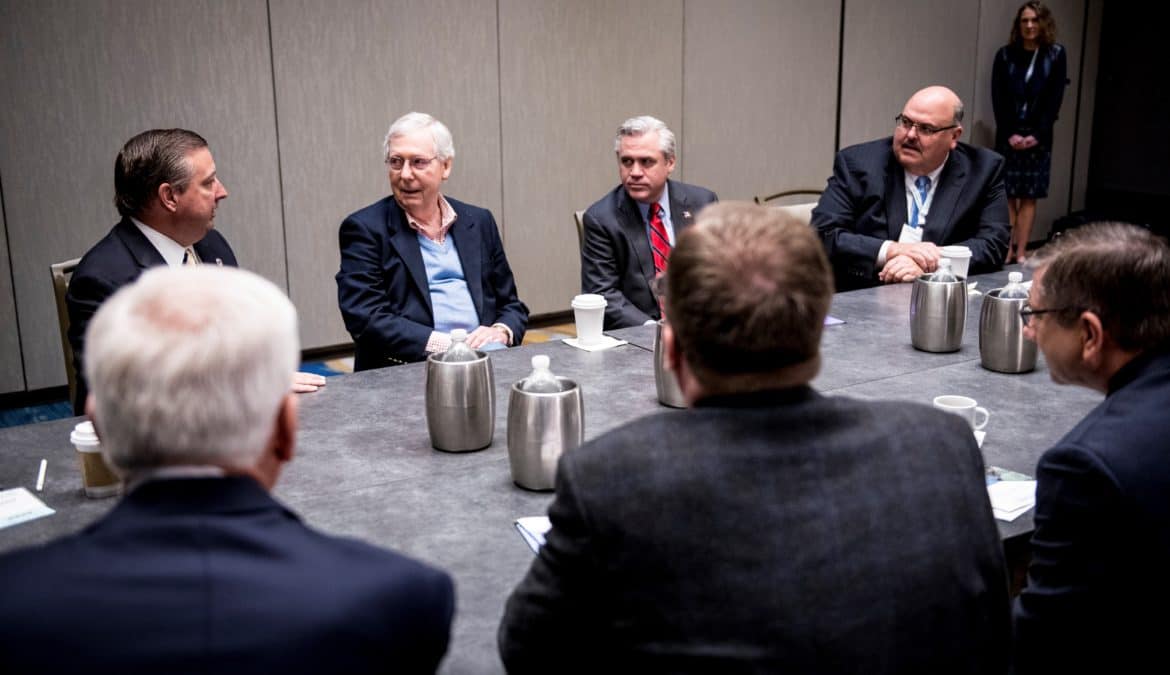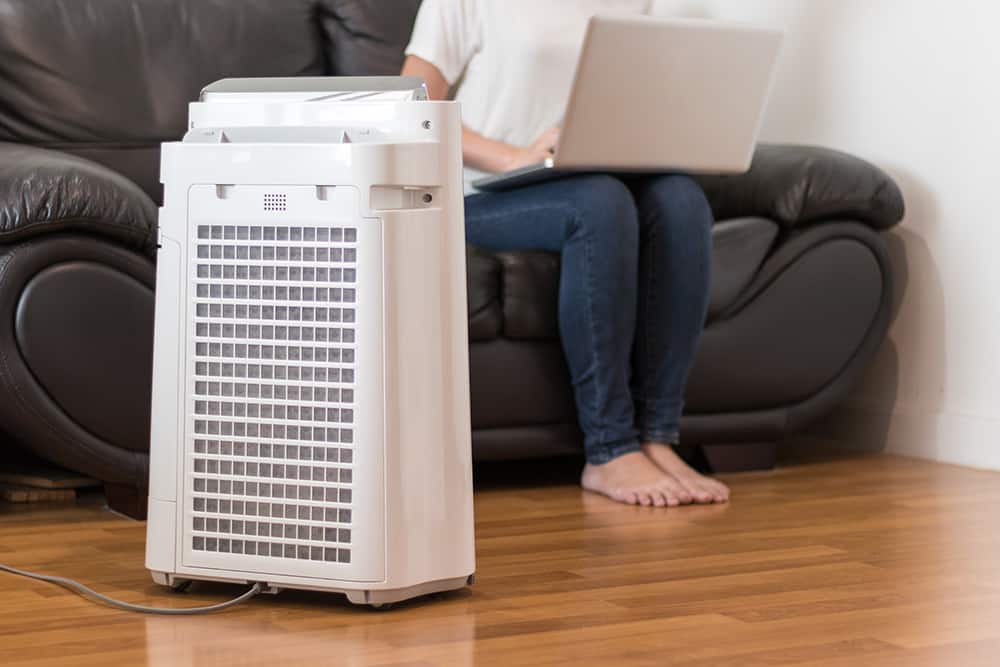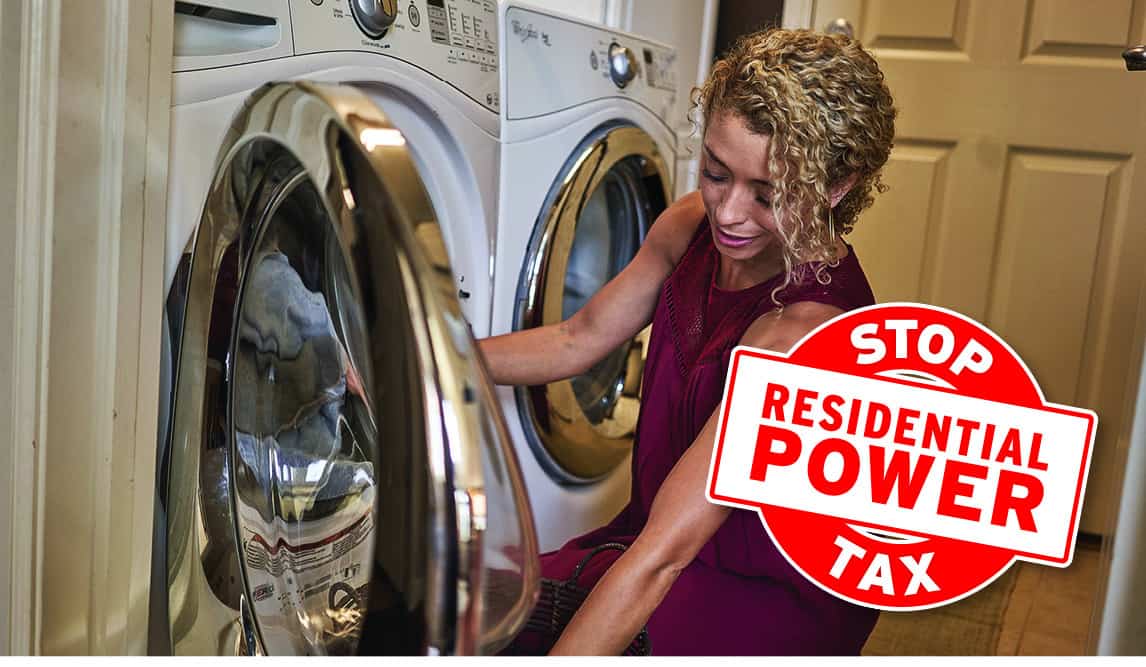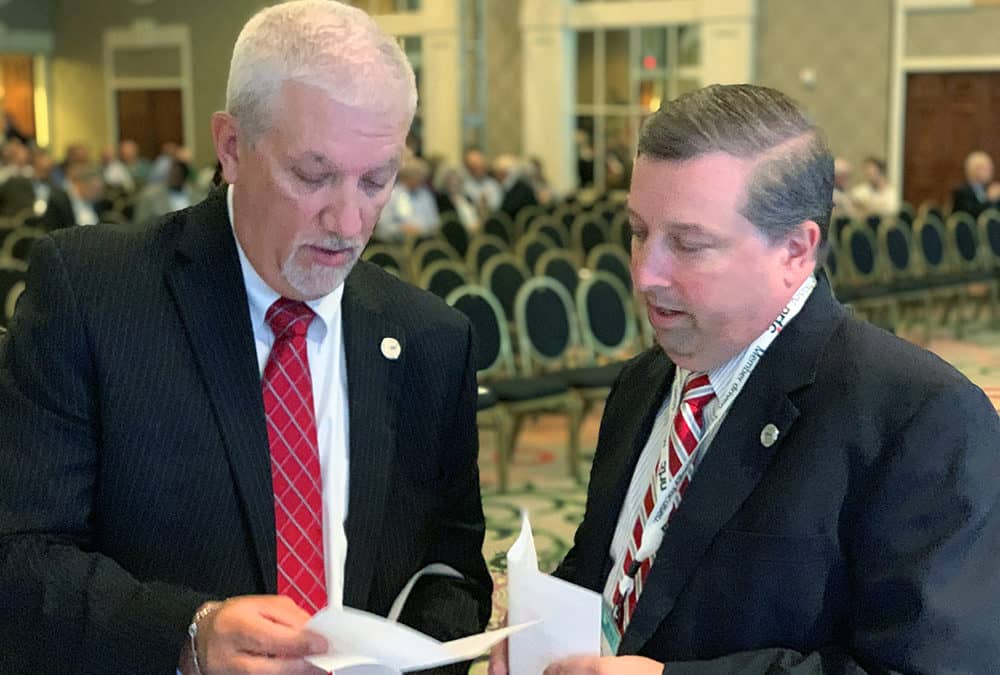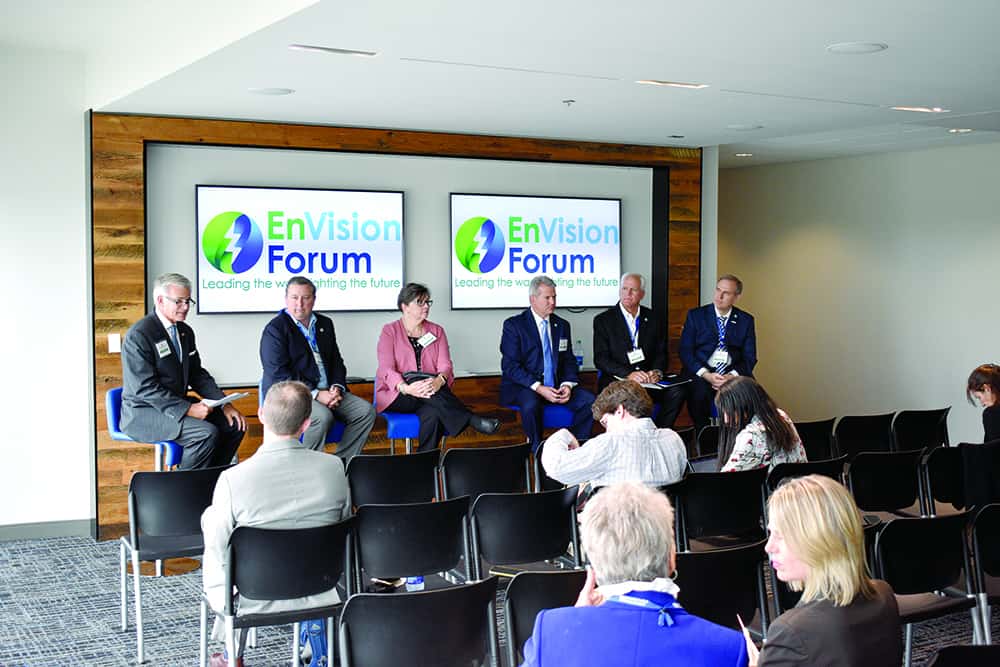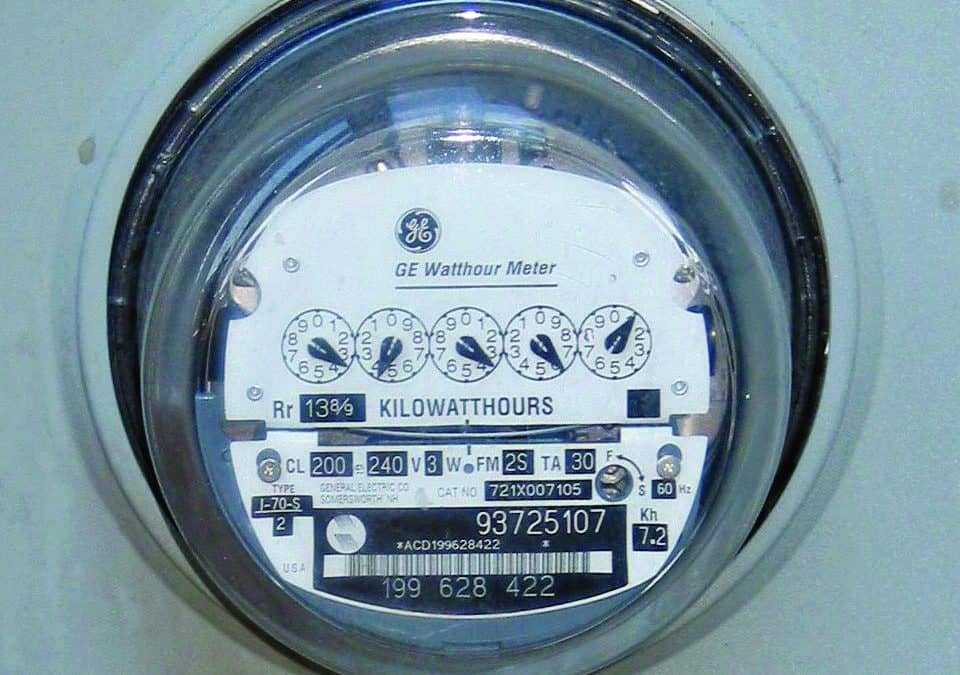The Kentucky statewide office and United Utility Supply are giving back to the community during the holidays! Employees donated over 275 non-perishable items to the Dare to Care Food Pantry located at Lighthouse Christian Church in Louisville. Volunteers served a chili supper and were able to provide 50 food boxes to families in need. We are proud to support one of the cooperative business principles- Commitment to Community.
Category: Public News
Kentucky co-ops cheer House vote for RURAL Act
The United States House of Representatives on Tuesday passed the RURAL Act, protecting more than 900 electric cooperatives throughout the nation from the risk of losing their tax-exempt status when they accept government grants for disaster relief, broadband service and other programs that benefit co-op members.
The Senate is poised to pass the bill later this week, and President Trump is expected to sign it into law.
Kentucky Electric Cooperatives has been advocating for the RURAL Act with Kentucky’s Congressional delegation, with four co-sponsors from Kentucky, Rep. Andy Barr, Rep. James Comer, Rep. Brett Guthrie, and Rep. Hal Rogers. Kentucky Rep. John Yarmuth also voted in favor of the bill.

In addition, Kentucky’s co-ops have been encouraged by the support of Senate Majority Leader Mitch McConnell of Kentucky on the issue. McConnell listened to the concerns of co-op leaders at the Kentucky Electric Cooperatives Annual Meeting in November.
“We appreciate the members of Kentucky’s congressional delegation who listened to our concerns and are standing up for the local consumer-members of Kentucky co-ops,” said Chris Perry, president and CEO of Kentucky Electric Cooperatives. The statewide association represents 26 co-ops in Kentucky.

“The overwhelming support of the RURAL Act, despite what congressional observers considered its unlikely passage, also speaks to the strength of the electric cooperative program when local consumer-members speak with one voice,” Perry continued. “The passage of this legislation is an affirmation of cooperative principles. We are all in this together.”
The RURAL Act is the National Rural Electric Cooperative Association’s top legislative priority for the year because of the profound threat to the business model of not-for-profit co-ops. Tens of thousands of co-op leaders, employees and members across the country rallied to advocate passage of the bill.

“This package preserves the fundamental nature of the electric cooperative business model and will save electric co-ops tens of millions of dollars each year,” said NRECA CEO Jim Matheson. “Moreover, it protects co-op members from unfair increases in their electric rates and provides certainty to co-ops that leverage federal and state grants for economic development, storm recovery and rural broadband deployment.”
Lawmakers passed the popular bipartisan legislation in the final hours of the 2019 session as part of a larger tax and spending bill that funds the government through September 2020.

The bill’s passage fixes a problem created in 2017 when Congress passed the Tax Cuts and Jobs Act, which redefined government grants to co-ops as income rather than capital. That change made it difficult for many co-ops to abide by the 15% limit on non-member income to keep their tax-exempt status. The RURAL Act once again exempts grants from being counted as income and is retroactive to the 2018 tax year.

Without the fix, some co-ops would have had to start paying taxes this spring after receiving grants in 2018 or 2019 to repair storm damage, bring high-speed internet to rural communities or invest in renewable energy and energy-efficiency programs. Many co-op leaders feared they would have to raise rates for members to pay the new taxes.
The legislation attracted more than 300 co-sponsors in the 435-member House and more than half of the senators. The effort was led in the House by Reps. Terri Sewell, D-Ala., and Adrian Smith, R-Neb., and in the Senate by Rob Portman, R-Ohio, and Tina Smith, D-Minn.
NRECA lobbyist Paul Gutierrez credited the victory to a collaborative campaign strategy that included co-ops’ grassroots efforts to alert their senators and representatives to the issue.
“This was an amazing NRECA team and membership effort, including co-op members at the end of the line,” he said. “We had great legislative champions in the House and Senate, and they worked tirelessly to get this included in the final tax package.”
A fan of winter: Using ceiling fans can save on energy costs in winter
Most people know ceiling fans can keep you cooler in the summer, but did you know they also can help warm a home in winter?
In warm months, ceiling fans are set to rotate counterclockwise to create a breeze that cools the skin, though they don’t actually cool the air. In the winter, you should set your fan to clockwise rotation. This pushes down warm air—which rises—and redistributes the heated air through the room. Though this won’t warm the whole house, some studies have shown reversing your ceiling fan in the winter can save as much as 15% on heating costs.
To prevent a too-drafty chill, turn the fan on the lowest speed setting. It may take some adjustments to get the right blend of warm air without a cool draft. With a high vaulted ceiling, it may not even be necessary to reverse the rotation if the fan is set on a low speed.
It’s easy to change the direction on most modern ceiling fans. Just turn off the fan and locate the direction switch, usually on the fan motor housing. Flip the switch and turn the fan back on.
A ceiling fan with a built-in heating element is another option for winter. It still can be used in summer like a regular fan with the heating element switched off. And for balancing temperatures in a two-story home, try mounting a ceiling fan at the top of an open staircase.
—Madelynn Coldiron
Breathe easy: Tips for using room air cleaners
The most important factor in a room air cleaner isn’t the size or price of the unit, but the type of filtering material inside.
For the most effective air cleaning, particularly during winter, use a high-quality central heat pump/furnace air cleaner along with room air cleaners. Some newer central air cleaners are effective, but they remove only the particles that get into the duct system.
When you plop down on a sofa or walk on the carpeting, a cloud of allergen particles will fill the air. Some of these particles are relatively large and settle out of the air before they ever get near the furnace return air registers. An efficient room air cleaner can remove many of these particles using minimal electricity.
Instead of relying on advertising, use the CADR (clean air delivery rate) rating to compare air cleaners’ effectiveness. The Environmental Protection Agency and the American Lung Association recognize the CADR data as accurate and realistic.
Match cleaner to particles
First, have your children tested to determine what airborne allergies they have, and then choose an air cleaner based on the type of particles pinpointed. Three of the most common types of particles in room air are household dust, tobacco smoke and pollen. These cover the size range of most other typical airborne particles. The CADR ratings use separate numbers for the three types and the rating system also indicates the maximum room size for which the air cleaner will be effective.
For example, an electrostatic air cleaner with washable cartridges is effective for tiny smoke particles, but a media filter is better for removing larger pollen and mold spore particles. A HEPA filter removes most particles, but its powerful fan uses more electricity. HEPA and media air cleaners require periodic filter element replacements.
If your allergies are with the larger particles, turn off the air cleaner if the room will not be used an hour or more. These larger particles settle back down and will not be significantly removed with continuous operation.
JAMES DULLEY is a nationally syndicated columnist who writes on energy efficiency and do-it-yourself energy topics.
No sales tax on your power bill
I need your help to keep your electric bill as affordable as possible.
Ahead of the Kentucky General Assembly convening for its budget session in January, I urge you to tell your legislators not to add any sales tax on residential power bills.
Connecting with your specific lawmakers is made easy on our new grassroots website, RuralPowerKY.com. Simply fill in your address and the website will have an email ready to send to your senator and representative.
Under current law, residential electric bills are exempt from the state’s 6% sales tax. However, as the General Assembly continues to consider new sources of revenue, potentially removing more exemptions from the sales tax, co-ops are urging legislators to protect the exemption on residential electric bills.
Since we launched this campaign in October, we are thankful that some lawmakers have affirmed they would not consider this proposal. Even if you want to thank your legislators for opposing this tax, it is important that they still hear from you and understand that you care about this.
The way co-ops judge every expenditure is whether it helps us serve our consumer-members. A tax on every residential power bill would not help us serve our members. By keeping costs as low as possible, co-ops not only help household budgets, but also economic development in communities across rural Kentucky.
Chris

Rural act to fix tax law unintended consequence
Electric cooperative leaders from Kentucky are joining co-ops across America calling on Congress to fix an unintended consequence of changes to federal tax law, warning that co-ops risk losing their nonprofit status if a major ice storm or tornado strikes a state.
To maintain tax-exempt status, no more than 15% of a co-op’s annual gross income can come from sources other than co-op members. Under the new law, government grants are considered non-member income—increasing the risk that co-ops working to restore their systems after major storms or help their community will be forced to forfeit their tax-exempt status.
Other federal or state government funding that could fall into this category are grants for economic development, energy efficiency and rural broadband deployment.
Without tax-exempt status, co-ops will be forced to return a significant portion of those funds to the government in taxes rather than using the monies for their intended purpose.
“These changes leave a cloud of uncertainty hanging over electric co-ops,” says Marty Littrel, president and CEO of Meade County RECC, one of 26 electric cooperatives in Kentucky. “This uncertainty puts co-ops and their communities in a difficult position as they work to plan for the future.”
The Rural Act is bipartisan legislation that would correct this mistake. Co-sponsors include Kentucky Congressmen Andy Barr and James Comer.
—Joe Arnold
Advancing the state’s energy future
Kentucky Electric Cooperatives President Chris Perry was among more than 150 energy leaders from across the country who gathered at the University of Kentucky’s Kroger Field in October to discuss America’s energy future.
“It is important that electric cooperatives and rural America are part of the national energy conversation,” Perry says, “Co-ops have both real-world experience and a keen interest in helping shape the next chapter of safe, reliable and affordable electricity.”
Hosted by the Federal Energy Regulatory Commission and UK’s Center for Applied Energy Research, the EnVision Forum was attended by U.S. Department of Energy Deputy Secretary Dan Brouillette, who is nominated to be the next secretary.
Discussion topics included the need for investment in energy infrastructure, the implications of climate concerns and how the epidemic of opioid use is threatening the future energy workforce.
“The modern energy landscape is rapidly evolving,” says FERC Chairman Neil Chatterjee, a Lexington native. “The energy economy is in a period of significant and rapid change.”
UK President Eli Capilouto praised the “bright minds, fearless leaders and innovative trailblazers” on the forefront of the energy discussion.
“As the commonwealth’s flagship and land-grant institution, this is what it’s all about, convening experts, disseminating knowledge and seeking solutions. It reflects our innate desire to expand what is possible,” says Capilouto.
Landfill power in Morehead
The old saying of “one man’s trash is another man’s treasure” is taking on new meaning at a landfill in eastern Kentucky.
In October, Fleming-Mason Energy Cooperative joined North American Bio Fuels and Advanced Disposal Services to dedicate a new renewable energy plant fueled by methane from the Morehead Landfill.
“As a result of this project, Fleming-Mason Energy Cooperative will provide clean, renewable energy to its members,” says Joni Hazelrigg, president and CEO of the co-op, which will purchase all energy generated by the plant. “We are excited to help make this possible for the communities we serve.”
The Morehead Generating Station can make 1.6 megawatts of energy, enough to power over 600 homes.
As organic waste breaks down in the landfill, flammable methane gas is produced. The gas is collected by a system of pipes within the landfill and piped to the plant, where it is used as fuel.
“This plant runs 80% to 90% of the time, which is very efficient for a renewable power plant. It has been fantastic working with both Fleming-Mason Energy and American Disposal Services,” says Brian Evans, chief operating officer of North American Bio Fuels.
North American Bio Fuels operates a similar facility at Blue Ridge Landfill in Irvine.
Operation Round-Up beautifies Elizabethtown
Thanks in part to Nolin RECC consumer-members who “round up” their bill to the nearest dollar each month, a Greenspace project at Freeman Lake is a reality.
An Operation Round-Up community impact grant funded the project to place stone pillars at two new bridges and to plant blooming crabapple trees in one of the most active trail entrances.
“Without a doubt, Nolin RECC members have contributed to the quality of life in our community and we are proud to have them as a partner of Greenspace,” says Elizabethtown Councilman Matt Deneen, a Greenspace board member. “The community impact of the Round-Up grant program is a leading example of what a cooperative can achieve when it is built upon a foundation of service not only to its members but to the community as a whole. The example Nolin RECC has set is the cornerstone of quality and credibility that will be needed to inspire other businesses and individuals to contribute additional trees to the area as the project expands.
Co-ops honor McConnell as 2019 ‘Distinguished Rural Kentuckian’
Highest honor awarded by Kentucky Electric Cooperatives
LOUISVILLE, Ky. (November 18, 2019) – U.S. Senate Majority Leader Mitch McConnell (R-KY) was honored on Monday, November 18 as the “2019 Distinguished Rural Kentuckian” at the 73rd Annual Meeting of Kentucky Electric Cooperatives. The award is the highest honor given by the statewide association of Kentucky’s electric cooperatives which serve nearly 1.5 million Kentuckians in 117 of 120 Kentucky counties.
“Senator McConnell is a champion for rural Kentucky,” said Chris Perry, president and CEO of Kentucky Electric Cooperatives. “Time and time again, he has been there for co-ops when it matters most. And, what’s striking is how responsive he is to the issues of rural Kentucky and America.”
Perry said McConnell’s leadership securing access to sensible financing and USDA funding has helped Kentucky co-ops deliver safe, reliable and affordable electricity, and McConnell’s advocacy for sensible environmental regulations has protected the consumer-members of Kentucky co-ops.
“We know that Leader McConnell’s clout means good things for Kentucky and we appreciate his hard work and dedication to fight for rural priorities,” Perry continued. “As Majority Leader, he gets to set the agenda and because of that, rural Kentuckians have a lot to be grateful for. Our agenda is his agenda.”
“As a predominantly rural state, we’re made stronger by our heritage,” said U.S. Senate Majority Leader McConnell. “From the Big Rivers to East Kentucky Power, your 26 statewide electrical cooperatives are making a real difference in the lives of families and communities. You’re helping power Kentucky’s future, support good jobs, and drive our economic prosperity. I’m grateful for your advocacy and keeping me up to date on your priorities, and I’m honored to receive this award.”
First elected to the U.S. Senate in 1984, Senator McConnell is Kentucky’s longest serving senator and the longest serving Republican Senate Leader in U.S. history. In addition to serving on the Senate Agriculture Committee, Senate Rules and Administration, he also serves on the Senate Appropriations Committee – the committee which holds jurisdiction over discretionary spending.
Through the years, Senator McConnell has fought for many priorities important to rural Kentucky, including major tax reform, regulatory relief, infrastructure, rural broadband development and healthcare. Senator McConnell is well-known as a champion for rural Kentuckians – their jobs, families and futures. He has secured vital funding for our communities and been the voice for all Kentuckians in Washington.
Living in the present
Major holidays like Thanksgiving naturally make you think about family, childhood memories and the gifts of love and togetherness of past holidays.
It has been a tough year for me. Both of my parents passed away. My father lost his battle with Alzheimer’s disease and a couple of months later my mother lost her battle with Parkinson’s disease.
As we enter the holiday season, I have a hole in my life. No more picking up the phone to talk about football. No more visits discussing the grandchildren. No more laughs. No more hugs. All that is left are the memories and photographs that I now cherish.
Thanksgiving was a wonderful time when I was growing up. I loved waking up on those mornings in my house with the smell of turkey and pumpkin pie. My mother loved the Macy’s Thanksgiving Day parade and we would watch every minute while she continued to work hard making a wonderful meal. Dad would make the patented Perry potato salad. My aunt would bring the deviled eggs. Those afternoons were perfect with our family sharing a meal and sharing time together.
After the stuffing and pumpkin pie were finished, my brother and I would watch some football. My dad and uncle would go outside in the cool air and enjoy smoking a cigarette. After some time passed, we would convene again for a little more pie, coffee and Pepsi. After a wonderful day, we would hug and look forward to the upcoming Christmas season, when we would do it all again.
I miss those days. So, as we enter the holidays and spend time together, I ask that you to try to avoid the distractions of the season and be fully present with the ones you love.
I found out this year that those moments are fleeting, and I will appreciate the ones now a little more. My wife, daughters and friends are the world to me, and I promise to be engaged and live life filled with focus and purpose.
May you and your family have a blessed Thanksgiving.
Chris

Smart grid, better reliability
The traditional electric grid has evolved into the modern smart grid, packed with advanced technologies that benefit both consumers and utilities.
A key feature is the smart meter, which provides two-way communication between the energy provider and the consumer. Smart meters help detect power outages and automate billing. Both help to improve reliability and efficiency.
Research and innovation continue to add improvements, making problems in the grid easier to prevent early on, easier to identify and easier to fix. The smart grid also helps utilities plan for the future to reduce the likelihood of power blackouts and surges, and to better manage the electricity load, which can ultimately save money for the utility and consumer.
Another consumer benefit is more access to information and new ways to control and manage their energy use online or via app before they receive their monthly bill, which can lead to better energy efficiency habits.
By investing now in smart grid technologies, utilities will help to reduce costs over the long run while also providing more reliable service to those they serve.
Over the next decade, utilities are expected to invest $110 billion in smart grid technologies, and this value is likely to grow as new technologies are developed. Many electric cooperatives across the U.S. have started initiatives to deploy smart meters and other advanced grid infrastructure.
—Maria Kanevsky/NRECA



